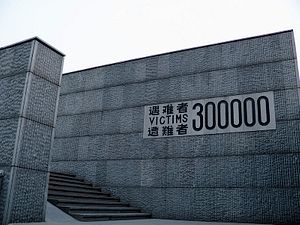The problem with using rhetoric as a weapon in the international arena is that even if governments decide to rein in their words, individuals might not comply. Thus the latest wrench in China-Japan relations comes courtesy of author Naoki Hyakuta. Hyakuta, who is currently a governor of the NHK (Japan Broadcasting Corporation), made comments denying the Nanjing Massacre, one of the most inflammatory historical legacies left over from Japan’s invasion of China during World War II.
According to The Asahi Shimbun, Hyakuta made his remarks in a February 3 speech, while campaigning for Toshio Tamogami, a right-wing candidate for Tokyo governor. In his speech, Hyakuta presented views of World War II generally in line with a far right-wing stance that absolves Japan of responsibility. “In 1938, Chiang Kai-shek tried to publicize Japan’s responsibility for the Nanking Massacre, but the nations of the world ignored him. Why? Because it never happened,” Hyakuta said. He also posited that the Tokyo war crimes trials were a sham “conducted to cover up those [U.S.] atrocities,” referring to the fire-bombing of Tokyo and the atomic bombs dropped on Hiroshima and Nagasaki.
Hyakuta did admit that “during wars, some military personnel may have done cruel acts” but he quickly added “that is not something only the Japanese have done.” He also argued, “There is no reason to teach such things to children who are still in compulsory education. I want to first teach children what a wonderful nation Japan is.”
While Hyakuta is allowed to participate in political activities as a private citizen, critics used his controversial stance to critique the NHK in general, or even Japan’s government at large. The NHK was already under scrutiny for comments made just last week by new NHK Chairman Katsuto Momii. Momii indicated that he would like the broadcaster to align its programming with the government’s stance on territorial disputes. He also downplayed the issue of “comfort women,” saying that all countries at the time had used similar practices. The public backlash in that instance was quick — NHK reported that it received over 12,000 comments, most of which were negative, about Momii’s remarks from the public. Hyakuta’s remarks, coming so close on the heels of Momii’s gaffe, only provide more ammunition to NHK’s critics.
China’s media has also called NHK’s credibility into question. Xinhua reported on a response to Hyakuta’s comments in the Nanjing-based Xinhua Daily. The article argued that, due to Hyakuta’s position at NHK, “how can people be convinced that the Japanese media are taking an objective and just stance toward history?”
In addition, though he was speaking as a private citizen, China has interpreted Hyakuta’s remarks as closely in line with the Japanese government’s grand strategy to “whitewash history.” Due to the ongoing Chinese New Year holiday, the Chinese Foreign Ministry is not holding its regular daily press conferences. However, the Foreign Ministry felt the issue was important enough to merit a response from spokesman Hong Lei who released a statement. Hong called the remarks “a blatant challenge to international justice and human conscience.” He added, “Such erroneous behavior follows those of the Japanese leader who tries to reverse the history.”
Chinese media agree that Hyakuta was simply following Abe’s lead. The Xinhua Daily report argued that “although Hyakuta’s speech was claimed to be ‘personal opinion,’ it came in perfect unison with the moves of the Abe administration, as the denial of the massacre is just like the acts of revising textbooks, rewriting the pacifist constitution and the visit to the Yasukuni shrine.” The article added that “Hyakuta’s fallacy itself deserves no comment, but the repeated reference of the cliché by Japanese right-wing forces needs to be observed with high vigilance.”
Chinese media was not alone in noting connections between Hyakuta and the government at large. The Asahi Shimbun noted that Hyakuta had been “handpicked by Prime Minister Shinzo Abe” to serve as NHK governor. Abe may now be regretting that choice. Denying the Nanjing Massacre is probably the easiest way to raise Chinese ire, and the last thing Japan needed was for tensions between Tokyo and Beijing to rise another notch.

































